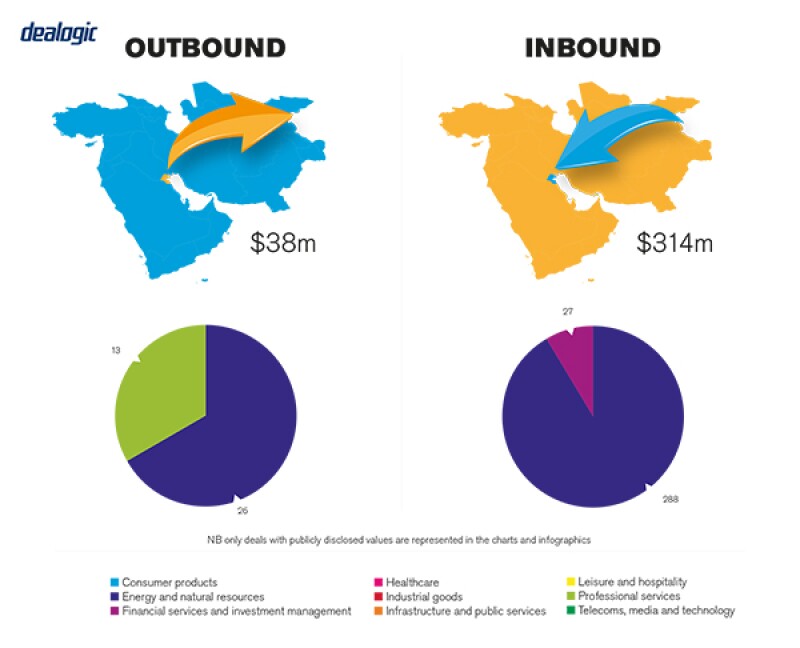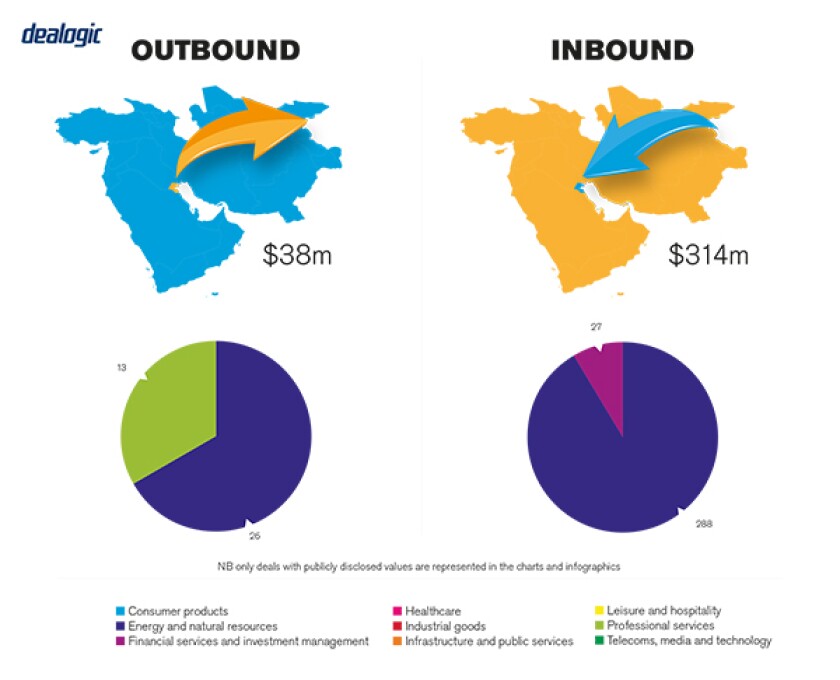John Cunha and Ezekiel Tuma, ASAR – Al Ruwayeh & Partners
MARKET OVERVIEW
The last twelve months have seen some consolidation activity in the financial sector of Kuwait. Notable in this regard is the proposed takeover of Bahrain based Ahli United Bank BSC by Kuwait Finance House KSCP, Kuwait's largest Islamic bank. Mergers in other GCC (Gulf Cooperation Council) jurisdictions have also impacted the Kuwait market, for example the merger of Union National Bank and Abu Dhabi Commercial Bank. There has also been some consolidation activity among Kuwaiti investment companies where smaller niche investment companies are being acquired by larger and longer established investment companies in Kuwait. Lastly, we have also seen a slight uptick in public M&A activity in Kuwait.
M&A activity
Reliable information on M&A activity in Kuwait is not publicly available. That being said, although the only notable change has been the character of the participants involved the pace of M&A activity in 2018 has largely remained the same as in 2017.
The Kuwaiti market remains primarily driven by private M&A transactions. However, we have in the last 12 months seen a slight uptick in public M&A transactions; we expect that there will be more momentum generated in the area of public M&A, and particularly there be further consolidation in the financial sector in Kuwait.
TRANSACTION STRUCTURES
The prevailing trend over the last 12 months has been centered around industry consolidation. Along with recent public M&A activity, financing considerations also impact on deal structuring, particularly in relation to the providing of security for financing. Additionally, Kuwait law foreign ownership restrictions also impact on M&A transactions and have to be catered for accordingly.
Financial investors
We are of the view that financial investors have a limited impact on the M&A market in Kuwait.
Recent transactions
A number of transactions have raised issues with regard to the scope of confidential information that can be made available to potential purchasers in the context of both private and public targets. The debate is mainly due to a lack of clarity on the subject under the companies and securities laws and regulations. Until this is resolved by clarifying amendments or guidance from the authorities, the matter will be left to parties to determine on a case by case basis.
LEGISLATION AND POLICY CHANGES
Law No. 7 of 2010 as amended ( CML) and its executive bylaws (CML Bylaws) together with the CML (CML Rules), particularly Book IX (Mergers and Acquisitions) of the CML Bylaws, forms the primary legal framework governing public M&A in Kuwait. The CML Rules apply to M&A transactions where there is an acquisition or consolidation of control of a Kuwait incorporated company listed on Boursa Kuwait (formerly known as the Kuwait Stock Exchange); a listed or unlisted company in the event of a reverse acquisition; a listed company by way of a partial purchase offer (resulting in an acquirer holding no less than 30% and no more than 50% of the shares of a listed company).
The Kuwait Capital Markets Authority (CMA) is the primary regulator for public M&A activity in Kuwait. The CML Rules provide a statutory framework for public M&A in Kuwait where there is a takeover offer for 100% of the share capital of a company listed on Boursa Kuwait, and a mandatory takeover offer which must be made to remaining shareholders when the offeror acquires more than 30% of the shares of a listed company.
Recent changes in law
As part of the wider trend of financial industry consolidation which we have observed over the last 12 months, there have also been legislative changes to the rules concerning foreign ownership of companies listed on Boursa Kuwait. The relevant legislation in this regard concerns Law No. 201 of 2000 and its implementing regulations, issued on September 5 2000 pursuant to Ministerial Decree 205 of 2000. Of importance, Article 3 of Ministerial Decree 205 of 2000 (MOCI Decision 205 of 2000) was amended pursuant to Article 1 of Ministerial Decree 694 of 2018 (MOCI Decision 694 of 2018). These resolutions are only relevant to non-Kuwaiti persons. In essence, MOCI Decision 205 (as amended) provides that the previous restriction on limiting non-Kuwaiti persons to own no more than 49% of a Kuwaiti bank without the prior approval of the Kuwait Counsel of Ministers has now been removed. However, what does remain intact is the requirement that prior approval from the Central Bank of Kuwait (CBK) is obtained by an investor (whether Kuwaiti or non-Kuwaiti) where an investor is looking to acquire over 5% of the total issued share capital of a Kuwaiti bank.
Further developments have occurred in the CML Rules. In this regard, the CMA, in Book 9 (Mergers and Acquisitions) of the CML Bylaws, has further clarified and confirmed the disapplication of the provisions of Book 9 of the CML Bylaws for non-Kuwait incorporated companies which are dual listed on Boursa Kuwait and are the subject of M&A activity.
Book 9 of the CML Bylaws has also been supplemented to provide for the execution of a partial purchase offer (PPO). PPO transactions apply when an acquirer offers to purchase no less than 5% of the shares of a listed company and leads to a holding of no less than 30% and no more than 50% of the total share capital of a listed company, post completion of the PPO transaction.
Lastly, Boursa Kuwait previously adopted and implemented certain special trade rules which were prescribed by the CMA. In implementing the special trade rules and further developing the application at Boursa Kuwait, the special trade rules have now evolved into what is now know as off-market negotiated trades (or simply just off-market trades), the rules of which are outlined in the 2018 version of the Boursa Kuwait Rulebook. In essence, off-market trades are trades whose nature requires that they are preceded by an agreement between a buyer and a seller of shares in a listed company at an agreed price and quantity (which can now exceed 5% of the shares of a listed company). Amongst others, the execution of an off-market trade requires the following: that the trade value be no less than KD150,000 (approximately $493,000); the prior approval of Boursa Kuwait be obtained for the trade; that the trade occur via a CMA licensed broker; and that the cash settlement for the trade be made in accordance with the T+3 settlement cycle of Boursa Kuwait.
Regulatory changes under discussion
We understand that amendments to the Competition Law and the executive regulations will be forthcoming, however, we note that to date no legislative amendments have been promulgated and/or issued in the Kuwait Official Gazette.
Value-added tax (VAT), although not applicable in Kuwait at the moment, needs to be considered for future structuring purposes in M&A transactions. Investors should be aware that the GCC states, including Kuwait, have agreed to the implementation of a GCC-wide VAT framework (the Framework), to be introduced at a rate of 5% VAT on goods and services, which was to take effect from January 1 2018. Kuwait has recently announced however that it will postpone the implementation of VAT in Kuwait until 2021. In addition, the Kuwait government is implementing fiscal reforms that include introducing a proposed 10% corporate income tax. The national legislation in Kuwait that will implement the Framework has yet to be promulgated and no Kuwait-specific details of the regime have been released as this time.
MARKET NORMS
Some of the misconceptions with regards to the Kuwaiti market include: poor disclosure processes because sellers are sometimes inexperienced in the M&A processes, and targets do not keep track of all the documents needed for disclosure to the buyers; and misconceptions about the regulatory processes, which are often more complicated than parties might expect. In addition, a common mistake made by practitioners is to import legal structures and documentation developed in other jurisdictions without proper adaptation to the peculiarities of the Kuwait legal system. This can lead to complications in the execution phase of the transaction and in the enforcement of rights arising under M&A transaction documentation.
Frequently overlooked areas
An area that is often overlooked and/or paid less attention to, is due diligence. In particular, appropriate translation of due diligence findings into contractual protections, whether by means of pre-closing remedial actions, associated variation of commercial terms, special indemnities or other methods is deficient. This often arises because the legal practitioners that carry out the due diligence do not always lead the negotiation of transaction documentation. Parties involved in an M&A transaction also often overlook certain aspects of the Kuwait competition law. Furthermore, the rendering of M&A/investment advisory services with respect to securities onshore of Kuwait is a regulated securities activity under the CML Rules. As such, foreign services providers should be aware of the restrictions applicable in connection with the rendering of such services onshore of Kuwait.
PUBLIC M&A
The key factors for a public M&A transaction are the following. Parties must obtain all relevant regulatory consents from the applicable regulatory body, such as for example, the CMA for licensed companies and/or (as applicable) the CBK vis-à-vis financial institutions which are subject to supervision by the CBK. The transaction must be disclosed as required per the CML Rules. The transaction must abide by the laws and regulations in each relevant sector. For example, pursuant to the CML Rules, for companies listed on the exchange of Boursa Kuwait an MTO must be launched by the bidder once the bidder has come into possession of more than 30% of the voting shares of a target company listed on the exchange.
Conditions for a public takeover
An MTO must not be subject to conditions that can only be satisfied at the discretion, and in the subjective judgment, of the bidder or the target company, or where their satisfaction is within the control of the bidder or the target company. Only voluntary takeover offers (VTO) may be subject to conditions required by the bidder. However, in the case of an MTO takeover offer, no conditions may be imposed by the bidder.
Break fees
The terms of the agreement are generally left to the discretion of the parties. There are no specific rules in Kuwait dealing with break fees and parties are free to agree specific arrangements to this effect. We are not aware of any trends/market standards in this regard.

PRIVATE M&A
Regarding the use of consideration mechanisms in private M&A deals, locked-box mechanisms are common in Kuwait. Earn-outs and escrow are very common in larger transactions of KD30 million ($100 million) and above, whereas completion accounts are less used in the Kuwaiti market. The use of tools such as warranty and indemnity insurance are not common in Kuwait.
Conditions for a private takeover
An MTO must not be subject to conditions that can only be satisfied at the discretion, and in the subjective judgment, of the bidder or the target company, or where their satisfaction is within the control of the bidder or the target company. Only voluntary takeover offers (VTO) may be subject to conditions required by the bidder. However, in the case of an MTO takeover offer, no conditions may be imposed by the bidder.
Foreign governing law
The use of a foreign governing law and/or jurisdiction (for example, English law and English courts/arbitration in London) is more common in the case of mid- to upper-tier M&A transactions involving at least one foreign party, and less so in relatively small or purely local M&A transactions.
The exit environment
Exits in the market are usually structured as trade sales.
OUTLOOK
We anticipate a steady increase in public M&A activity in Kuwait over the next 12 months. We also expect further consolidation transactions in the financial industry. The outlook for public M&A in Kuwait continues to benefit from the further development of the CML Rules (for example, the introduction of PPO transactions etc.) as well as that of the development of Boursa Kuwait through various ongoing market development initiatives that will further develop Kuwait as a favourable foreign investment destination.
About the author |
||

|
|
John Cunha Partner, ASAR – Al Ruwayeh & Partners Kuwait T: +965 2292 2700 F: +962 22400064 John Cunha is a partner at ASAR and has been with the firm since April 2006. John practices in the areas of banking and finance, capital markets and mergers and acquisitions. He holds a law degree awarded by the University of the Free State, South Africa, 1999. In 2002, John was also awarded a master of business administration degree (MBA) from the University of the Free State, South Africa (in collaboration with De Paul University in Chicago, USA). John also holds a master of laws degree (international trade law) (LLM) awarded by the University of Stellenbosch, South Africa. He was admitted to the South African bar in 2000 and was admitted as a solicitor of the Senior Courts of England and Wales in 2007. John's practice languages are English, Afrikaans and Portuguese. |
About the author |
||

|
|
Ezekiel Tuma Partner, ASAR – Al Ruwayeh & Partners Kuwait T: +965 2292 2700 F: +962 22400064 Ezekiel Tuma is a partner at ASAR and has been with the firm since March 2008. Ezekiel practices in the areas of mergers and acquisitions, private equity, corporate law, banking and finance, project finance, restructuring and insolvency and oil and gas. Ezekiel has been involved at a senior level and has led on several corporate, M&A, private equity, banking and financing transactions ranging from typical transactions to highly complex ones. Ezekiel holds a bachelor of laws degree (LLB) awarded by Makerere University Kampala, Uganda, 1997. He also holds a master of laws degree (commercial) (LLM) awarded by the University of Cambridge, UK, 2000. Ezekiel was admitted to the Ugandan bar in 1999 and is a member of the International Bar Association. Ezekiel's practice languages are English, French and Swahili. |


